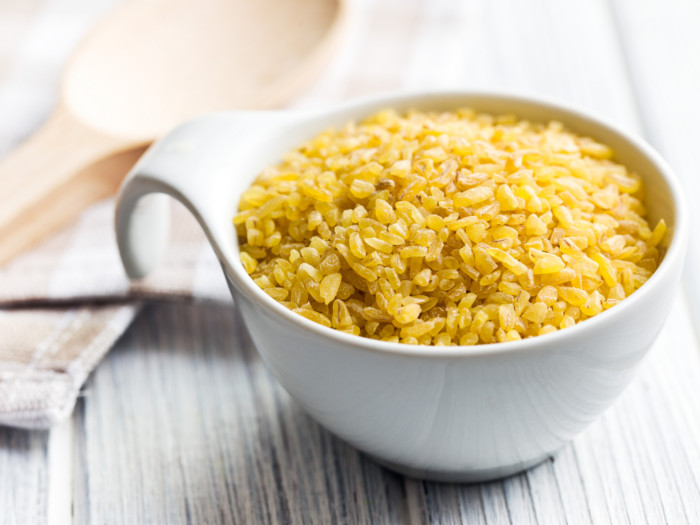While bulgur wheat may not always be your first grain of choice, it is surprisingly nutritious and has a number of health benefits. They include its ability to improve digestion, stimulate growth and development, boost circulation, aid in sleep, prevent chronic disease, and protect the immune system, among others.
What is Bulgur Wheat?
Bulgur wheat is a mixture of the groats (hulled kernels) from different types of wheat that are found in the Middle East, India, or Europe. This ingredient is very popular in various side dishes and is able to cook very quickly, which makes it a convenient and versatile food. If you are a fan of those cuisines, then you have likely experienced bulgur as an ingredient in tabouleh. It in many forms, including pasta, bread, and warm or cold grain salads. [1]
While there are many varieties of cereal in the world, many of them come from refined wheat, which is then used to produce refined carbohydrate foods. These are good for your health, but they don’t compare to the raw, nutrient-packed nature of this wheat.
How Does it Taste?
Bulgur wheat has a nutty flavor of similar whole grains that have a chewy texture. It has an appealing popcorn scent when it is cooked.

Bulgur wheat is a delicious staple of Middle Eastern cuisine, traditionally used to make pilaf and tabbouleh. Photo Credit: Shutterstock
Serving Size : Nutrient Value Water [g] 9 Energy 342 Energy [kJ] 1431 Protein [g] 12.29 Total lipid (fat) [g] 1.33 Ash [g] 1.51 Carbohydrate, by difference [g] 75.87 Fiber, total dietary [g] 12.5 Sugars, total including NLEA [g] 0.41 Calcium, Ca [mg] 35 Iron, Fe [mg] 2.46 Magnesium, Mg [mg] 164 Phosphorus, P [mg] 300 Potassium, K [mg] 410 Sodium, Na [mg] 17 Zinc, Zn [mg] 1.93 Copper, Cu [mg] 0.34 Manganese, Mn [mg] 3.05 Selenium, Se [µg] 2.3 Thiamin [mg] 0.23 Riboflavin [mg] 0.12 Niacin [mg] 5.11 Pantothenic acid [mg] 1.05 Vitamin B-6 [mg] 0.34 Folate, total [µg] 27 Folate, food [µg] 27 Folate, DFE [µg] 27 Choline, total [mg] 28.1 Carotene, beta [µg] 5 Vitamin A, IU [IU] 9 Lutein + zeaxanthin [µg] 220 Vitamin E (alpha-tocopherol) [mg] 0.06 Vitamin K (phylloquinone) [µg] 1.9 Fatty acids, total saturated [g] 0.23 8:0 [g] 0.01 14:0 [g] 0 16:0 [g] 0.2 18:0 [g] 0.01 Fatty acids, total monounsaturated [g] 0.17 16:1 [g] 0.01 18:1 [g] 0.17 Fatty acids, total polyunsaturated [g] 0.54 18:2 [g] 0.52 18:3 [g] 0.02 Tryptophan [g] 0.19 Threonine [g] 0.35 Isoleucine [g] 0.46 Leucine [g] 0.83 Lysine [g] 0.34 Methionine [g] 0.19 Cystine [g] 0.29 Phenylalanine [g] 0.58 Tyrosine [g] 0.36 Valine [g] 0.55 Arginine [g] 0.58 Histidine [g] 0.29 Alanine [g] 0.44 Aspartic acid [g] 0.63 Glutamic acid [g] 3.88 Glycine [g] 0.5 Proline [g] 1.28 Serine [g] 0.58 Sources include : USDA [2]
Bulgur Wheat Nutrition Facts
The key components of bulgur wheat include high levels of iron, magnesium, potassium, zinc, niacin, copper, phosphorous, manganese, fiber and dietary protein. This varietal offers a higher concentration of minerals, vitamins, antioxidants, and fiber than refined wheat, making it even more beneficial for human health. There are also very few calories and fats, which can make this a very important food for people on a diet.
Health Benefits of Bulgur Wheat
Bulgur wheat has many important benefits. So let us look at them in detail.
Improves Digestion
High levels of dietary fiber help stimulate digestive processes in the body and prevent certain conditions, such as constipation, bloating, cramping, and indigestion. This fiber can also improve the nutrient uptake efficiency in your gut, and improve your cholesterol balance by eliminating excess omega-6 fatty acids and buildup in the arteries. This wheat is significantly higher in fiber than many other common kinds of cereal. [3]
Diabetes Management
This wheat is traditionally and minimally processed. A study published in The American Journal of Clinical Nutrition suggests that such grains could have a lower glycemic index, which is also seen in unmilled cereal. Owing to this, it could be helpful for people with diabetes, especially in cases of postprandial glycemia. [4]
Builds Strong Bones
The minerals in bulgur wheat make it important for many organs, but it is particularly good for improving bone strength. As we age, bone mineral density naturally declines, so we need ample amounts of phosphorus, manganese, iron to keep our bones healthy and prevent osteoporosis. This wheat delivers these minerals in high concentrations, making this cereal a major bone-booster! [5]
Protects the Heart
Aside from the effects that fiber has on the buildup of cholesterol in the heart, bulgur wheat can help cardiovascular health in other ways too. There is a significant amount of potassium in bulgur wheat, and this is a known vasodilator, which means that it can reduce the strain on blood vessels and arteries and lower blood pressure. For people who are at high risk of cardiovascular issues, bulgur wheat is a wise dietary choice that can keep that hypertension in check. [6]
Increases Immunity
The broad range of vitamins and minerals found in bulgur wheat can have a serious impact on the immune system. Zinc, in particular, has been linked to a stronger immune response in the body, and bulgur wheat happens to have significant levels of this mineral in every serving – nearly 20% of the suggested daily intake. [7]
Boosts Circulation
Iron is a key mineral in our diet because it has such a major impact on our circulatory system. Iron deficiency is called anemia and can result in weakness, disorientation, fatigue, and stomach disorders. This is because iron is a necessary component in red blood cells, and when our circulation decreases, so too do our energy levels. A standard serving of bulgur wheat has about 15% of the daily requirements for this mineral. [8]
Weight Loss
The low-calorie, low-fat nature of this cereal grain makes it ideal for people who are on a diet. The high fiber content will make you feel more full, thus preventing overeating and between-meal snacking and also contribute less to your fat and calorie content. [9]
Antioxidant Properties
Grains and cereals aren’t commonly associated with having high antioxidant potential, but bulgur wheat does boast an antioxidant profile of phytonutrients that can help eliminate inflammation and reduce the mutation of healthy cells. Free radicals in the body stimulate oxidative stress in the body, and thus inflammation, which can lead to a number of health issues. [10]
Speeds Growth
Possessing all of the essential amino acids that our body needs for growth and development, bulgur wheat is an excellent source of protein, which our body needs to grow new tissues, cells, blood vessels, etc. If you are recovering from an injury or illness, having a high intake of complete proteins is essential for a fast recovery. [11]
Regulates Sleep
The impressive level of magnesium found in this grain makes it a great sleep aid, due to the effect that magnesium can have on the production of certain relaxing neurotransmitters. When your body releases these neurotransmitters, it calms the nervous system and soothes the mind, helping deliver restful and extended periods of sleep. Those suffering from insomnia and other sleep disorders should try bulgur wheat in their diet for a few weeks and will likely see a noticeable change. [12]
How to Cook Bulgur Wheat?
Let us look at a simple way to cook bulgur wheat.

Bulgur Wheat Recipe
Ingredients
- 1 cup bulgur wheat medium-grind
- 1/4 tsp salt
- 1 tablespoon olive oil extra virgin
- 1 1/2 cup water
Instructions
- Add oil to the saucepan and then add bulgur wheat and water.
- Mix it well and let it simmer. Once that is done, cover the pan cook the wheat on low flame for about 10-12 minutes.
- Keep an eye so that the wheat is not overcooked.
- Once you see that it has turned soft, remove the pan from heat and let it cool for some time.
- Serve it with salads or on its own!
Notes
Risks
Bulgur wheat is safe for consumption. However, increasing the intake of whole grains on a daily basis might increase the amount of bloating and constipation. Bloating is a common side effect of increasing the amount of fiber ingested on a daily basis. There is a possibility that a person may develop painful bloating if he/she is gluten intolerant. In such cases, it is advisable to consult a doctor for a better understanding of the bloating if it is severe or gives excruciating pain. [13]
